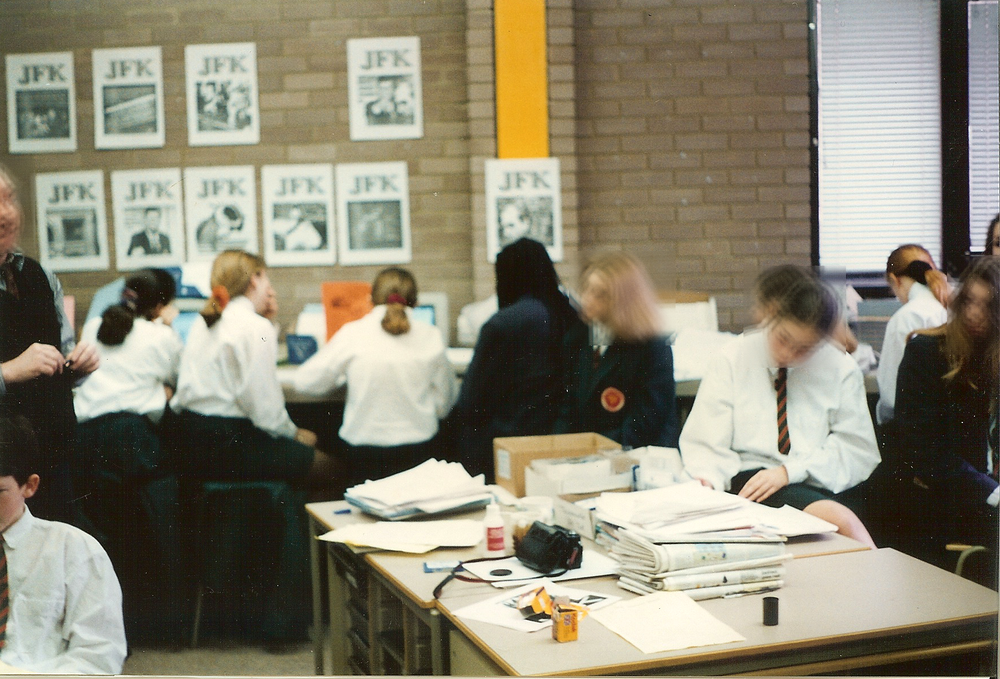I don’t think rules, as commonly formulated, are very useful in the context of Computing lessons.
Read MorePhoto by Terry Freedman
6 routines for Computing lessons Revisted
Routines are good, because pupils know what to expect. They are able to predict what is going to happen, and when. Some pupils, whose home lives are chaotic and unpredictable, may even feel safe because of routines. Here are some routines that I think are useful for Computing lessons.
Read MoreOn this day: The (digital) revolution comes to the London Barbican
I remember this exhibtion: it was pretty good, and I’m not somebody who is easily impressed. I thought the ideas were very creative, and I liked the interactivity.
Read MoreReasons to teach coding through problem-solving
Should you start with the raw components when teaching coding, or get the kids problem-solving immediately? This article argues in favour of the latter.
Read MoreIllustration of algorithmic objectivity, generated in ImageFX
Computing discussion topic
A topic to discuss with your students perhaps: the hidden bias in algorithms.
Read MorePupils working on computers, by Terry Freedman
On this day: How can a programming language be boring? (Plus Update)
Someone told me of an X exchange that took place a few weeks ago in which teachers were saying that their kids found Scratch boring. Well (he says, arms akimbo), here are my views on that.
Read MoreReview: Coderspeak – The language of computer programmers
This book won’t necessarily help a student pass a computing exam, but it will almost certainly make them a more aware, and thus better, programmer.
Read MoreENIAC. U.S. Army Photo [Public domain], via Wikimedia Commons. Picture credit for Eniac: This image is a work of a U.S. Army soldier or employee, taken or made as part of that person's official duties. As a work of the U.S. federal government, the image is in the public domain. URL: https://commons.wikimedia.org/wiki/File:Eniac.jpg
Getting touchy and feely about Computing -- illustrated
Making it possible for students to come face to face with real things from times gone by can have an electrifying effect on them. This is especially so when teaching Computing.
Read MoreWhy you should collaborate on a Computing scheme of work (Updated)
In the article 12 Characteristics of a good Computing Scheme of Work I said that people should work with other people on their Computing scheme of work. Why?
Read MoreCome back! Drawing by Terry Freedman
Computing in Schools, UK
I've been reading the transcript of a conference called Computing in England's schools, from July 2022. Yes, I'm a bit behind the times on this, so I apologise. However, I think anyone who has been involved in educational computing for any length of time…
Read MoreUsing spreadsheets or Python to process words
A couple of people and I started to discuss how we might use technology to process a block of text.
Read MorePhoto by Julius Drost on Unsplash
The Magic of Human-Computer Communication (revisited)
 Magicians demonstrate that some kinds of human mistake are not down to stupidity or negligence but about how our brains are wired. Computer Scientists have to understand this too but instead engineer systems so no one makes mistakes – especially in critical situations like a hospital. The machines need to help not hinder. Professor Paul Curzon explains...
Magicians demonstrate that some kinds of human mistake are not down to stupidity or negligence but about how our brains are wired. Computer Scientists have to understand this too but instead engineer systems so no one makes mistakes – especially in critical situations like a hospital. The machines need to help not hinder. Professor Paul Curzon explains...Driverless car, by Terry Freedman
Driverless cars: technology trumps experience - again (Updated)
If you want an excellent example of the triumph of hope over experience, look no further than the optimism surrounding driverless cars.
Read MoreKettles and algorithms (Updated and expanded)
Like many English people, the most important thing to me is having a decent cup of tea. So I was delighted when we bought a variable temperature kettle. This doesn’t just heat up the water to boiling point. It lets you select the right temperature for the kind of drink you have. But how does it work?
Read MoreHow can CHatGPT be used in education? And can it write decent book reviews?
I asked ChatGPT, and here’s what it said…
Read MoreQuick look: Strange Code
Strange Code looks at esoteric languages and also atypical languages, which are those that are not mainstream.
Read MoreQuestion mark - Terry Freedman
National Coding Week: why? (Updated)
I’ve always been of the strong opinion that (a) people should talk about programming, not coding, and (b) people learn best on a kind of need to know basis.
Read More7 Expectations for Computing lessons (update)
I don’t think rules, as commonly formulated, are very useful in the context of Computing lessons.
Read MoreJust because everyone says something is good, doesn't mean it is.
Making and programming
Is 'making' really an effective -- or cost-effective -- way of learning programming?
Read MoreReview: A student’s guide to Python for physical modelling
The book’s primary concern is enabling Python to be used for manipulating and plotting large datasets, dealing with image “noise” and other advanced topics.
Read More





![ENIAC. U.S. Army Photo [Public domain], via Wikimedia Commons. Picture credit for Eniac: This image is a work of a U.S. Army soldier or employee, taken or made as part of that person's official duties. As a work of the …](https://images.squarespace-cdn.com/content/v1/53b7d42de4b04cfc3188c6eb/1550079821886-TUICJIDYKXZIXMAK0OZX/ENIAC.jpg)







